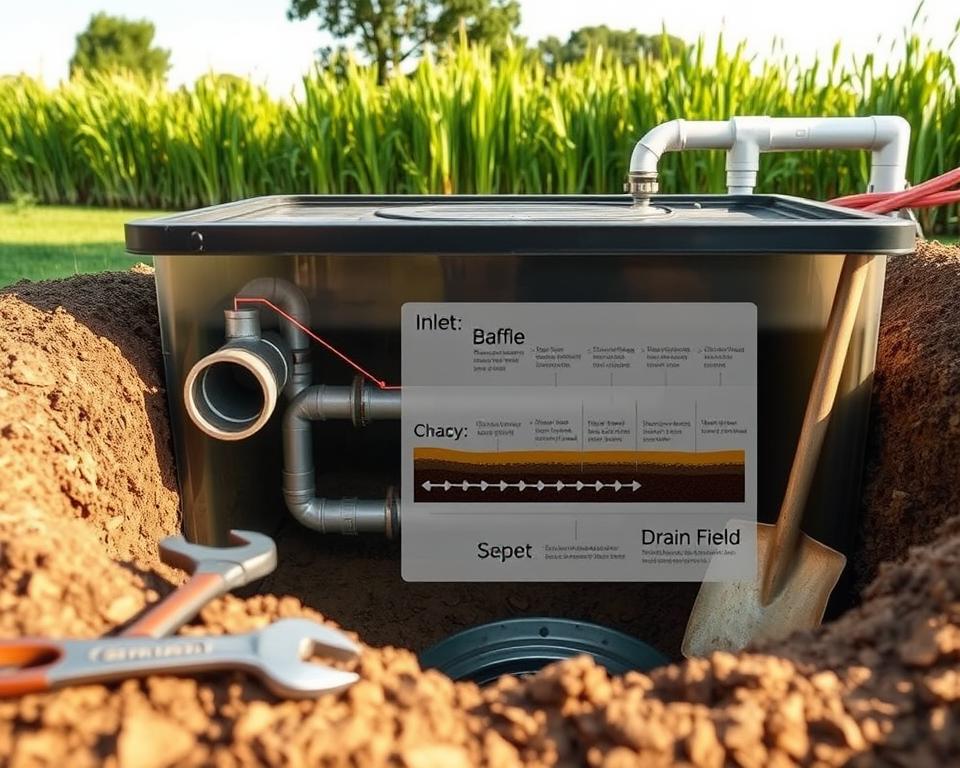Septic Tank Pump-Out: Essential Guide & Tips
Have you considered exactly where your used water flows after it exits your sink or loo? It’s managed by a carefully serviced septic system. Grasping the significance of septic tank pump outs is crucial for first-rate waste management at home. Overlooking this may cause backups and costly remedies. Our guide aims to highlight the value of septic maintenance and routine pump outs. By utilizing trustworthy septic services – septic tank inspection cost, you safeguard your home, the environment, and ensure your system’s longevity.
Main Points
- Consistent septic tank pump out avoids system failures and backups.
- Understanding your septic system helps with effective maintenance.
- Scheduling a pump out is critical for effective waste management.
- Watch for clues that suggest your septic tank needs attention.
- Choosing a qualified service provider can enhance system efficiency.
- Booking septic tank cleaning services safeguards your home and the environment.
Why Septic Tank Pump Out Matters
Arranging a septic tank pumping service periodically is critical for your system’s durability and function. As years pass, your tank accumulates solid waste and organic debris, that may trigger performance issues or even full system failure. Without septic system maintenance, you could face obstructed pipes and damaged drain fields – problems that typically come with high costs and serious inconveniences for homeowners.
By having professional septic tank services handle scheduled maintenance, you make sure your system runs smoothly. This practice not only prevents pricey overhauls but also protects the soil and groundwater around your home from pollution. When you opt for regular pump outs, you foster environmental health and have a steadfast and effective system for managing waste.
How Your Septic System Works
A typical septic system is pivotal in handling household wastewater. It’s composed of the septic tank, drainfield, and soil – parts that work together to effectively process waste. The septic tank offers a contained space for solid waste to decompose biologically.
It’s important for homeowners to understand how these units work. Keeping the septic system in prime form is vital to its longevity and effectiveness. Through regular inspections and cleaning the septic tank when necessary, owners can dodge expensive breakdowns that could result in serious health and environmental issues.
Regularly taking care of your septic system protects your property and supports public health. In the table below, see a table outlining the different septic system components and their functions:
| Component | Function |
|---|---|
| Septic Tank | Holds and decomposes solid waste through anaerobic bacteria. |
| Drainfield | Filters the treated effluent into the soil for further filtration. |
| Soil | Acts as a natural filtration layer to further treat wastewater. |
Appreciating these elements highlights the need for careful septic system care. Smooth operation relies on steady maintenance and cleanings by homeowners.
Timing Your Pump Out
Knowing when to get your septic tank pumped is crucial for its health. In most cases, a septic pump out should occur every 3 to 5 years. However, certain variables might change this schedule.
The occupancy level in your home heavily influences the pumping frequency. Extra residents mean more wastewater, resulting in more frequent maintenance. Moreover, habits like excessive laundry or long showers might demand quicker pump outs. Taking early actions can greatly extend your septic system’s life.
It’s wise to account for personal elements, such as tank size and daily water use, to keep a proper schedule. Remembering your last pump out date aids in timely planning for the next one, guaranteeing uninterrupted system performance.
Indicators It’s Time to Pump
Homeowners should be vigilant for signs that signal their septic tank needs pumping. Delayed sinks and toilets often point to an overfilled septic system, reducing the wastewater flow. Moreover, foul smells around your home could spell trouble; they may waft from the tank, showing system failure.
Visible wastewater pooling in the yard is another major indicator. When you see soggy areas or unexplained puddles, it’s probable your septic system is struggling. Ignoring these signs can escalate into more severe issues that disturb your home and become costly to resolve.
To head off serious complications, preventive maintenance is vital. Hiring a professional service like All in Sanitation can be a smart move. They can accurately diagnose and address these signs. This method not only handles immediate issues but also preserves your system’s efficiency and health.

Picking the Right Pump Out Service
It’s crucial to choose a competent septic tank pumping service to ensure your system performing properly. Trustworthy companies know the local regulations thoroughly, guaranteeing your septic system meets all requirements. A reliable service, like All in Sanitation, is committed to disposing of waste in an eco-friendly manner. This is critical for the environment’s well-being.
When searching for the right septic service, think about these important aspects:
- Experience and Reputation: Aim for companies with excellent feedback and established success in your region.
- Licensing and Insurance: Check that your preferred provider has the necessary license and insurance to cover unexpected problems.
- Comprehensive Services: Opt for a service that includes inspections with pumping, spotting issues before they get worse.
Paying for a good septic tank pumping service avoids costly future repairs. Periodic evaluations and consistent upkeep ensure your system in optimal condition. Making the right choice not only safeguards your investment but also maintains a effective waste management system for your home.
Septic Tank Cleaning: What You Need to Know
For homeowners, septic tank cleaning is essential to guarantee the system runs efficiently. During this process, extracting sludge and scum is critical to prevent blockages. A cleaned system not only performs optimally but also lasts longer. Performing regular cleanings is important for the health of your system.
A lot of households request extra services to improve septic tank care. These extras are beneficial for removing harmful bacteria and preventing residue build-up. Recognizing the necessity of proper maintenance can prevent costly overhauls. Staying ahead of maintenance guarantees both environmental safety and household well-being.
What Pumping Services Cost
Homeowners need to grasp septic tank pumping costs for efficient system maintenance. Prices vary greatly due to region, tank size, and preferred service provider. Typically, this service costs between $200 and $600. It’s smart to collect bids from multiple companies, considering both expertise and reliability.
Service providers like All in Sanitation supply fair rates. Yet, the cost of septic tank cleaning reflects service quality and thoroughness. Homeowners should weigh these aspects thoughtfully when choosing a service.
Reviewing quotes enables sound decisions that fit your budget and septic system needs. Knowing potential costs aids in financial planning for septic tank upkeep.
Septic System Maintenance Tips for Homeowners
Maintaining your septic system properly is essential. It ensures a durable and well-functioning setup. By following simple steps, the longevity of your septic tank extends, alongside money. Measures like reducing water use in your household play a critical role. Repairing leaks promptly and installing water-saving appliances are wise moves.
It’s important to not flush harmful substances down the drain. Chemicals, fats, or non-biodegradable items harm your septic system. For the wellbeing of your setup, discard such waste responsibly. This practice protects your septic tank’s natural processes.
Consistent inspections and the timely pumping are essential for septic maintenance. Aim to have your system inspected and serviced every three to five years. A maintenance schedule or checklist can be very useful. It assists homeowners in tracking their system’s condition and sticking to maintenance guidelines.
Acting ahead with septic maintenance offers financial and environmental gains. Through adopting these habits, homeowners enhance their septic systems’ efficiency and dependability. This commitment not only preserves your system but also promotes a healthier environment.
To Summarize
A septic tank pump out is essential for septic tank upkeep, and residents must consider it seriously. It wards off costly fixes and increases the system’s lifespan, allowing for effective operation over years. Recognizing when to address system distress signals shields your property.
Opting for a reliable provider, like All in Sanitation, makes all the difference in septic tank care. Their expertise ensures proper service, promoting both environmental health and your home’s comfort. Forward-thinking upkeep protects your investment and promotes a greener planet.
Staying informed about your septic system and its maintenance needs is crucial. Scheduled pump outs enhance home functionality and support public health. For any homeowner, understanding the significance of septic tank care guarantees a problem-free living environment for the future.


